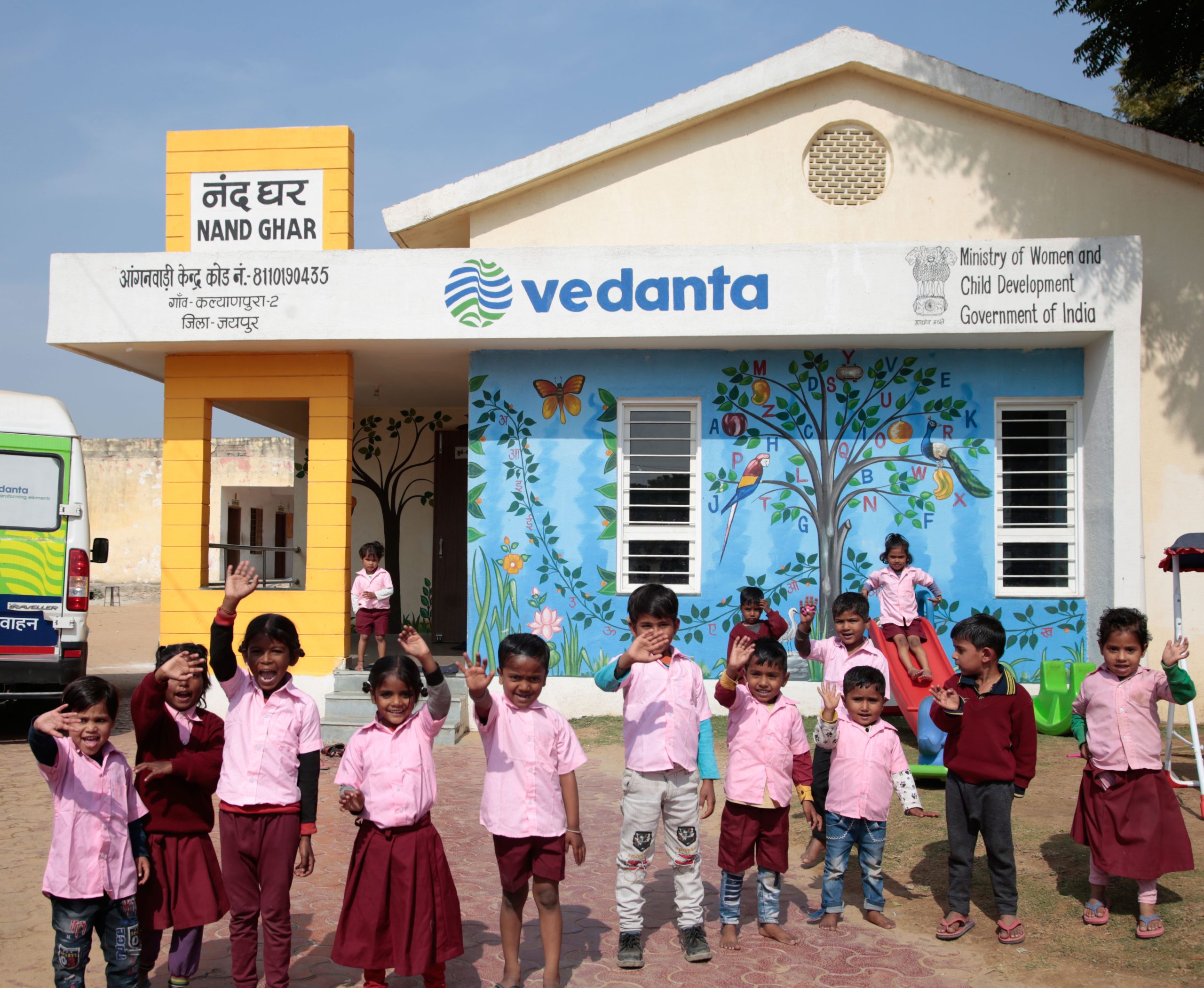

Literacy is a powerful tool for fighting poverty and the consequent adverse impacts that comes with it. Increased literacy rates have shown a positive correlation across several parameters, including infant mortality, employment, gender equality and holistic economic growth. Literacy has even impacted things like democracy, peace, quality of life. It also leads to better health and nutrition, thereby strengthening the learning capabilities of a child and significantly improving the productivity of an individual.
As per Census 2011, India’s literacy rate was 74 per cent. The country has approximately 472 million children, making it one of the world’s youngest countries (average population age). This is a great opportunity for the country’s economy, but only if this resource is skilled adequately towards maximising their contribution to the economy.
To bring about this transformational change, some of the largest companies have rolled out philanthropic projects across the country. One of the biggest among these is the Nand Ghar programme, the flagship programme run by my Foundation – Anil Agarwal Foundation. As Chairman of Vedanta, one of the world’s largest mining and metals companies in the world, I have personally pledged as much as Rs 5000 Crore towards my philanthropic ventures.
Our Nand Ghars are fast becoming a network of modern Anganwadis with state-of-the-art infrastructure working towards eradicating child malnutrition, providing high-quality pre-primary education, healthcare and empowering women with skills towards supplementing their household incomes. They provide continuous handholding and capacity building for Anganwadi workers and Sahayikas (Assistants) with comprehensive training, including a combination of classroom and in-person instruction to ensure that information is delivered effectively through engaging teaching techniques.
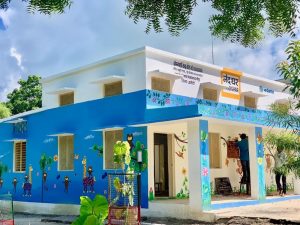 Our primary focus is to start at the grassroots level with the holistic development of children and women who form the future of our nation. With this objective, we have reimagined Anganwadis as ‘Nand Ghars’ (The Home for a Young One), as centres of learning for children and women. These centres provide access to critical infrastructure in healthcare, education, skill development and women empowerment. As a national project, our Nand Ghar story began in 2016. It essentially takes the Integrated Child Development Scheme (ICDS) of the government forward. We aim to create model Anganwadis not just for infrastructure or services but also for community integration. In partnership with the Union Ministry of Women and Child Development, our Nand Ghar project is unmatched in its scope and geographic reach.
Our primary focus is to start at the grassroots level with the holistic development of children and women who form the future of our nation. With this objective, we have reimagined Anganwadis as ‘Nand Ghars’ (The Home for a Young One), as centres of learning for children and women. These centres provide access to critical infrastructure in healthcare, education, skill development and women empowerment. As a national project, our Nand Ghar story began in 2016. It essentially takes the Integrated Child Development Scheme (ICDS) of the government forward. We aim to create model Anganwadis not just for infrastructure or services but also for community integration. In partnership with the Union Ministry of Women and Child Development, our Nand Ghar project is unmatched in its scope and geographic reach.
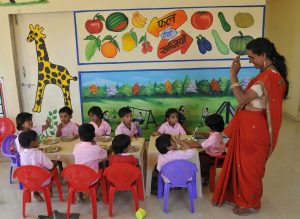
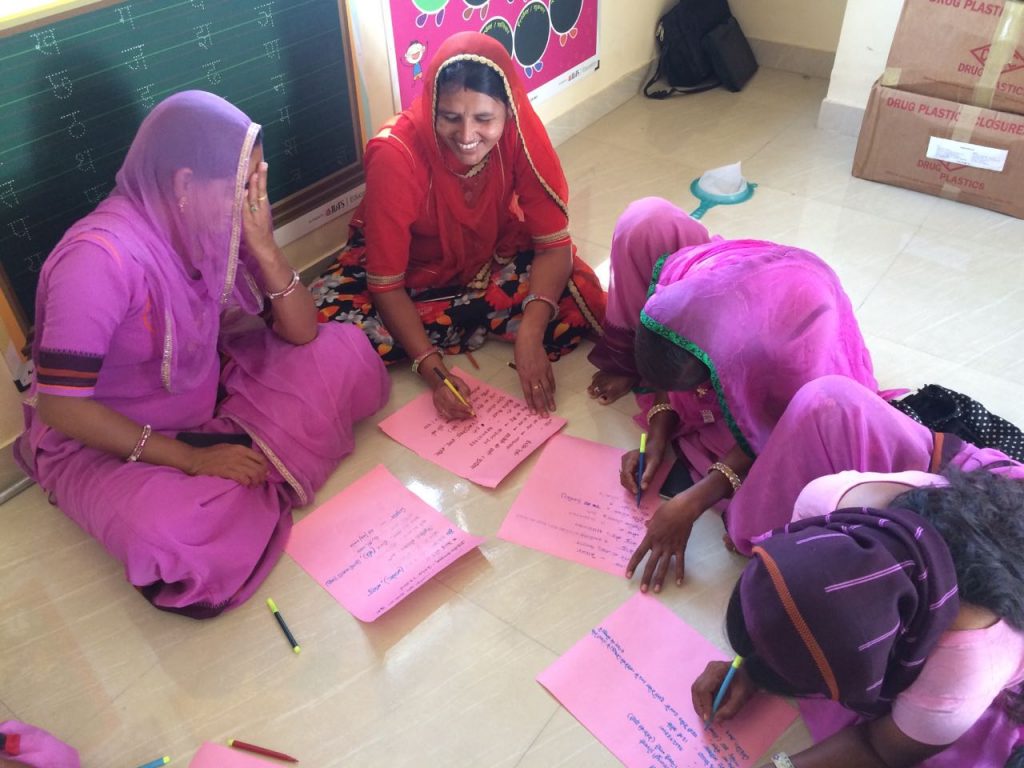
Our Nand Ghars are fast becoming a network of modern Anganwadis with state-of-the-art infrastructure working towards eradicating child malnutrition, providing high-quality pre-primary education, healthcare and empowering women with skills towards supplementing their household incomes. They provide continuous handholding and capacity building for Anganwadi workers and Sahayikas (Assistants) with comprehensive training, including a combination of classroom and in-person instruction to ensure that information is delivered effectively through engaging teaching techniques.
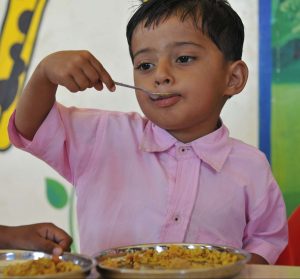 Every Nand Ghar renders services to 40 children. We provide hot cooked nutritious meals (dry and take-home rations during the pandemic), health and referral services and early childhood education. We also provide children in the 3-6 year category with an array of interactive teaching-learning methods offering high-quality education. By recognising the regional context while creating and
Every Nand Ghar renders services to 40 children. We provide hot cooked nutritious meals (dry and take-home rations during the pandemic), health and referral services and early childhood education. We also provide children in the 3-6 year category with an array of interactive teaching-learning methods offering high-quality education. By recognising the regional context while creating and 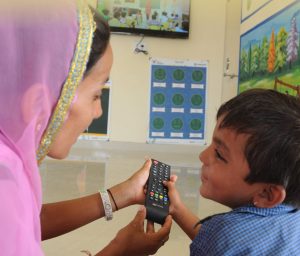 providing best-in-class coursework aligned with the State curriculum, we seek to be an aspirational pre-school delivering quality education and strengthening the child’s foundational years.
providing best-in-class coursework aligned with the State curriculum, we seek to be an aspirational pre-school delivering quality education and strengthening the child’s foundational years.
Primary features include creative murals, Building as Learning Aid (BaLA) boards, multimedia material presented on Smart TV, and an Early Learning Activity kit, creating a conducive atmosphere for the 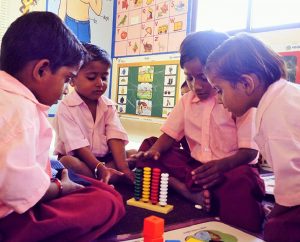 young learners. The curriculum is scientifically-created with early childhood development milestones in mind, is regionally tailored, including aspects of spoken and written English, and focus on instilling strong social values.
young learners. The curriculum is scientifically-created with early childhood development milestones in mind, is regionally tailored, including aspects of spoken and written English, and focus on instilling strong social values.
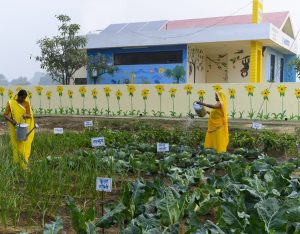 Our Nand Ghars also house Poshan Vatikas (Nutrition Gardens) to provide organic fruits and vegetables for the holistic nutrition of the beneficiaries.
Our Nand Ghars also house Poshan Vatikas (Nutrition Gardens) to provide organic fruits and vegetables for the holistic nutrition of the beneficiaries.
We aim to transform the lives of seven crore children and two crore women across 13 lakh+ Anganwadis in India. Currently, there are 2,592 Nand Ghars across 12 States. As part of the 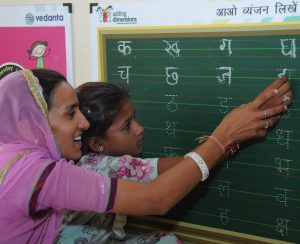 first phase, we aim to build 4,000 Nand Ghars by December 2022. While each Nand Ghar has a lifespan of two to three decades, we aim to build community capacity for long-term sustainability and foster indigenous leadership among community members.
first phase, we aim to build 4,000 Nand Ghars by December 2022. While each Nand Ghar has a lifespan of two to three decades, we aim to build community capacity for long-term sustainability and foster indigenous leadership among community members.
Recognising the strides been made by the project in 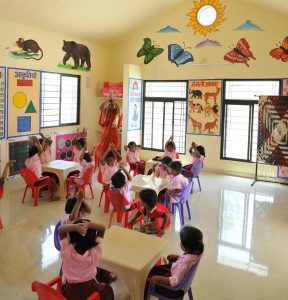 transforming rural India, Smriti Zubin Irani, Union Cabinet Minister of Women and Child Development, said, “Nand Ghar project by Vedanta is one of the finest examples of CSR. An important milestone for Vedanta, which has transformed the lives of rural women and children across India through its network of Nand Ghars, a modem, state-of-the-art version of the Anganwadi model. I was there for the first Nand Ghar launch four years back. The project has indeed come a long way since then.”
transforming rural India, Smriti Zubin Irani, Union Cabinet Minister of Women and Child Development, said, “Nand Ghar project by Vedanta is one of the finest examples of CSR. An important milestone for Vedanta, which has transformed the lives of rural women and children across India through its network of Nand Ghars, a modem, state-of-the-art version of the Anganwadi model. I was there for the first Nand Ghar launch four years back. The project has indeed come a long way since then.”
To ensure continuity of early childhood education during the pandemic, our project in Rajasthan collaborated with the State Government and UNICEF to develop interactive e-learning content for children. It was rolled out in 62000+ Anganwadis. We formed Nand Ghar WhatsApp groups for parents of registered children in which multimedia e-learning content was shared, daily.
During the pandemic, we rolled out an IVRS initiative with the tagline ‘Missed call do, Kahani Suno’ to motivate children to listen to the stories from the safety of their homes while also learning in the process. To ensure uninterrupted learning, we provided interactive content over WhatsApp, enabling parents to monitor their child’s progress.
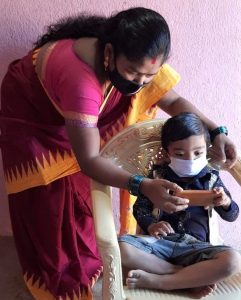 The impact of our Nand Ghars has been transformational. For example, Rekha Devi’s daughter is enrolled at Palai Nand Ghar in Niwai, Tonk. As pre-school education was suspended at the Anganwadis during the lockdown, Rekha was concerned about the disruption of her daughter’s education in her crucial formative years. “Like other parents in the community, I, too, was quite worried about my daughter’s education during this period.” To ensure continuity of early childhood education during the pandemic, our project in Rajasthan collaborated with the State Government and UNICEF to develop interactive learning
The impact of our Nand Ghars has been transformational. For example, Rekha Devi’s daughter is enrolled at Palai Nand Ghar in Niwai, Tonk. As pre-school education was suspended at the Anganwadis during the lockdown, Rekha was concerned about the disruption of her daughter’s education in her crucial formative years. “Like other parents in the community, I, too, was quite worried about my daughter’s education during this period.” To ensure continuity of early childhood education during the pandemic, our project in Rajasthan collaborated with the State Government and UNICEF to develop interactive learning 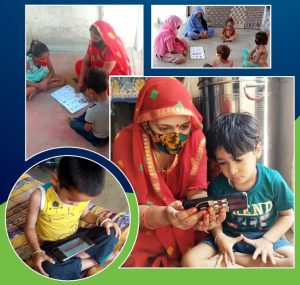 content for children. It was rolled out in 62000+ Anganwadis. We formed Nand Ghar WhatsApp groups for parents of registered children in which multimedia eLearning content was shared, daily. Rekha Devi was added to her Nand Ghar’s WhatsApp group in June 2020. Since then, she has been receiving e-learning material like educational videos, audios, and pictures to help her conduct interactive learning activities with her daughter. “The Nand Ghar eLearning programme has lifted a huge weight off my shoulders. My daughter has been even more engaged in her education as she gets to perform interactive learning activities with the family.” This initiative of the Government of Rajasthan helped more than 12 lakh children.
content for children. It was rolled out in 62000+ Anganwadis. We formed Nand Ghar WhatsApp groups for parents of registered children in which multimedia eLearning content was shared, daily. Rekha Devi was added to her Nand Ghar’s WhatsApp group in June 2020. Since then, she has been receiving e-learning material like educational videos, audios, and pictures to help her conduct interactive learning activities with her daughter. “The Nand Ghar eLearning programme has lifted a huge weight off my shoulders. My daughter has been even more engaged in her education as she gets to perform interactive learning activities with the family.” This initiative of the Government of Rajasthan helped more than 12 lakh children.
In healthcare, we rolled out our telemedicine-based healthcare solution along with the Paramedic-on-Wheels project. Community members can talk to doctors, get consultations and prescriptions in their vernacular language and over-the-counter medicines. As a part of the integrated healthcare model, our Nand Ghar project has deployed mobile health vans that provide preventative and curative healthcare services, doctor consultations, non-invasive basic tests and OTC medicines, free of cost.
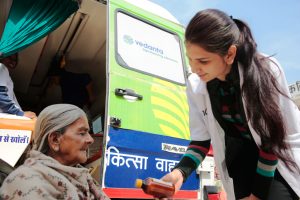
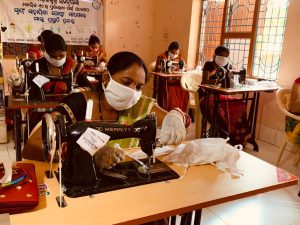
As part of our ethos, we believe the right path to the advancement of society begins with women being empowered. Our Nand Ghars provide skill training for women above 18 years of age through various trade-based training programmes with employment possibilities. These programmes have market linkages to make them sustainable. During the pandemic, Nand Ghar women stitched 1.5 lakh masks, adding about Rs 4000 to their household income.
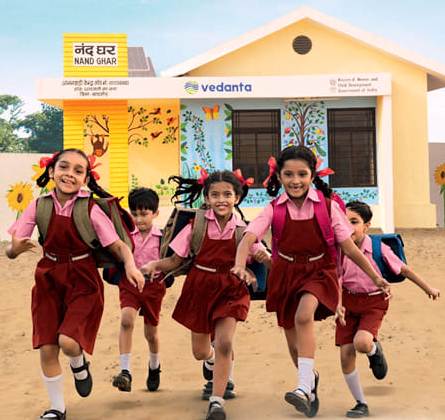
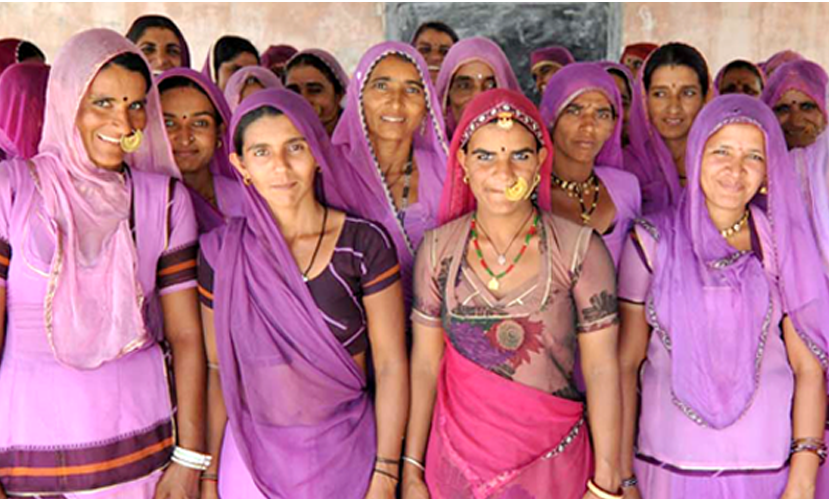
With strides being made by the Nand Ghar programme, it won’t be long before India can leapfrog into the league of nations that boast of an empowered and progressive population transformed by the Nand Ghar programme.

